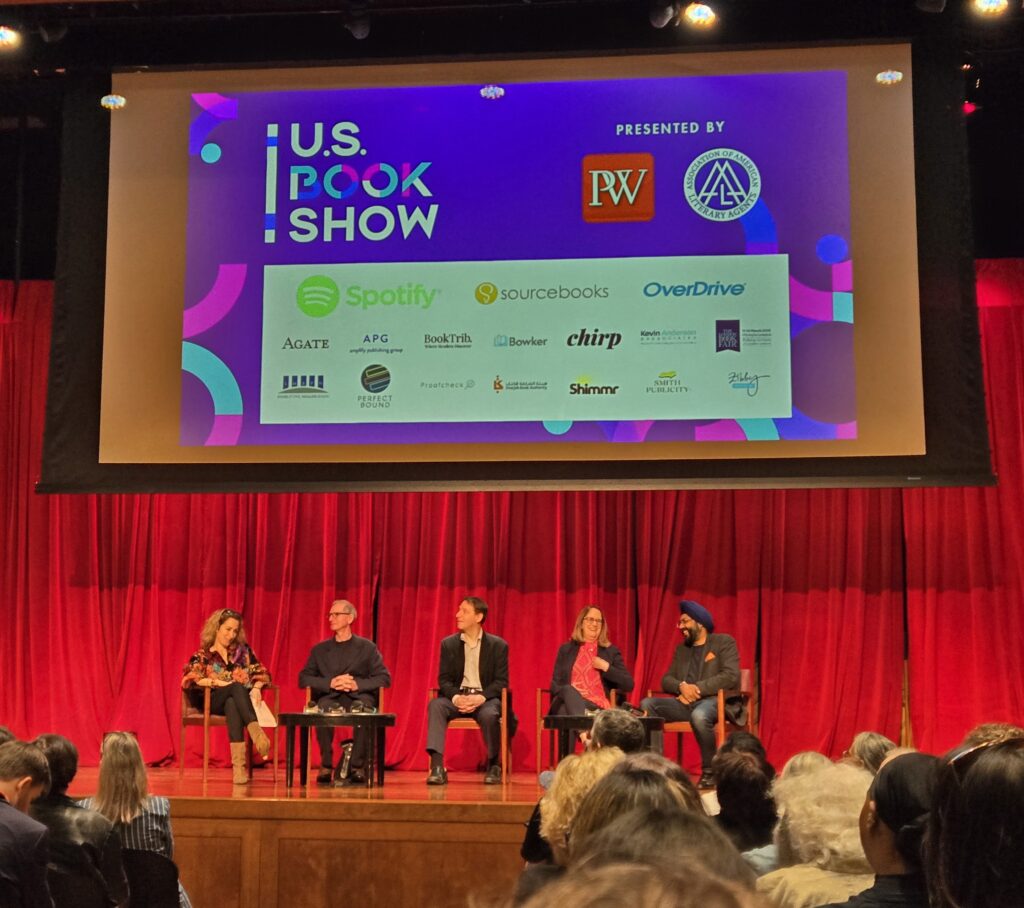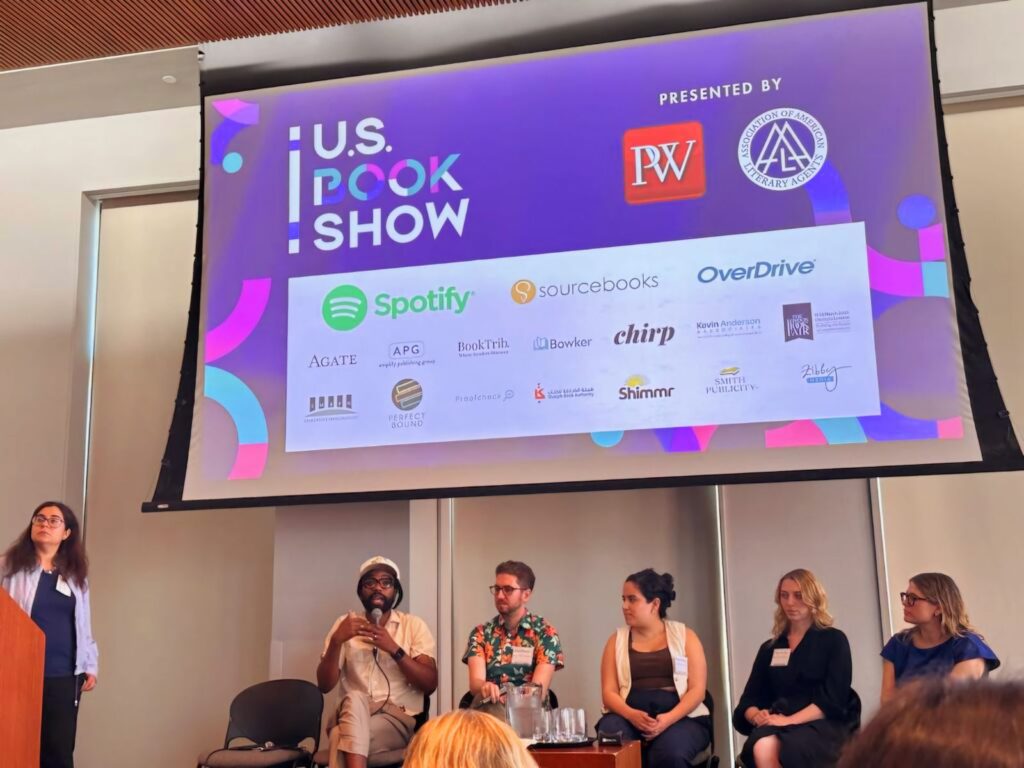The U.S. Book Show opened on May 22nd to an overflow crowd that represented a broader range of industry folk than most conferences do: presidents and past CEOs (like Marcus Dohle, wearing a Shimmr t-shirt, to announce his recent investment in the company); veterans like Carol Fitzgerald, president of The Book Report Network; graduate students from NYU and Pace’s publishing programs, and many agents, emerging and mid level/ publishers, media and more. Presented by PW, Association of American Literary Agents and a host of sponsors including Spotify, it was a lively, well-programmed day.
Followin g an introduction by NYU host and Associate Dean of NYU SPS Center for Publishing and Applied Liberal Arts, Andrea Chambers, and AALA’s Jennifer Weltz, the kickoff panel featured S&S’s Jon Karp, Scholastic’s Peter Warwick, Abrams’ Mary McAveney and Baker & Taylor’s Aman Kochar. They covered a range of topics from the added cost of cybersecurity to the promise of audiobooks. Karp talked about the need to bring in new talent at the top, given the problems faced in marketing new titles, while McAveney talked about publishers’ focus on finding and retaining a book or series’ audience. Warwick marveled at the possibility of a book’s “virtuous circle,” from first publication to a movie or streaming series, to multiple spinoff book series and tie-ins.
g an introduction by NYU host and Associate Dean of NYU SPS Center for Publishing and Applied Liberal Arts, Andrea Chambers, and AALA’s Jennifer Weltz, the kickoff panel featured S&S’s Jon Karp, Scholastic’s Peter Warwick, Abrams’ Mary McAveney and Baker & Taylor’s Aman Kochar. They covered a range of topics from the added cost of cybersecurity to the promise of audiobooks. Karp talked about the need to bring in new talent at the top, given the problems faced in marketing new titles, while McAveney talked about publishers’ focus on finding and retaining a book or series’ audience. Warwick marveled at the possibility of a book’s “virtuous circle,” from first publication to a movie or streaming series, to multiple spinoff book series and tie-ins.
In a breakout session, Overdrive CEO Steve Potash delivered a dynamic speech promoting librarians and educators as influencers. Using stats and slides, he showed that with 170 million public library cardholders in the U.S., not to mention more than one hundred thousand school libraries, there are a lot of ways to reach readers. Overdrive, which controls these markets, also hosts 25,000 digital book clubs for libraries, organizations, cities, even countries.
A discussion by Jaime Wolf, General Counsel of AALA and Hachette’s Janet Saines-Cardozo on Contracts and Copyright, focused mainly on AI and how publishers might ensure that authors’ and, increasingly, translators’ contracts disclose any use of AI. Both agreed this is a hard area to police, especially as it’s unclear where the “muscle” comes from to enforce these policies.
One of the particularly popular breakout sessions was the Young Publishing Forum, which covered finding or changing jobs, keeping up with industry moves and trends, building a network in a hybrid work

environment, and burnout. There was a lot of advice, and many questions from an eager audience. One knowledgeable insider suggested that panels such as this one ensured that the conference would attract some younger members of the industry.
Keith Riegert, CEO of Ulysses Press, gave a talk on how publishers could use AI, with very actionable advice on which platform to use for various tasks, from writing a press release to creating a contract generator to calculating a book’s net profit margin. Nevertheless, he worries that AI, which can also be used to create so much new content, “adds another substitute for things that take us away from reading. . . I’m into Al and I very much wish it didn’t exist.”
The “X Factor” panel brought agents, editors and publishers together to discuss what personal and leadership qualities are important. All agreed how lucky they were to have the careers they’ve had, and to be in this industry. Agent Todd Schuster pointed out that “showing up” and taking initiative are critical qualities, while Dawn Davis mentioned that she learned a lot from watching other people’s skills, including, when she was at Knopf, the legendary Sonny Mehta. Sally Kim thought that authenticity is key, while Dominique Raccah argue; for agility: “We’re the “yes – and” culture” at Sourcebooks. Meanwhile, when asked what makes a stellar employee, all agreed that kindness, high standards and having a distinctive point of view were important. Macmillan’s Sonali Goel adeptly moderated the panel.
A panel titled “Sales Says” brought together PRH’s Kristen Fassler, Abrams’ Christine Edwards, S&S’s Gary Urda, Macmillan’s Jennifer Edwards and HarperCollins’ Kelly Roberts. The themes that emerged were how retailers expect so much more from publishers in terms of early information, useful data, robust marketing and customized plans for their specific market. Urda mentioned, and others agreed, that with so little time available to sell each title “Anything that takes the buyer off track is bad for the book.” Meanwhile, all agreed that editors can educate themselves by spending more time in stores, and asking questions of their reps.
Two panels that both younger and more established publishers enjoyed brought agents and editors together to discuss their respective approaches to books and authors. One brought seven agents and editors together, including Dutton’s Maya Ziv and Curtis Brown’s Kerry D’Agostino to discuss how to work together, with some pointed criticisms on both sides and from the audience as well. The Auction panel got into the nitty gritty of whether round robin auctions were preferable to “first bid” auctions, and why editors like preempts but most agents don’t. The publishing people talked about “auction fever,” while agents debated going for the passionate editor rather than the highest bid. Putnam’s Ivan Held did a great job moderating CAA’s Anthony Mattero, Editorial Director S&S’ Stephanie Hitchcock, PRHs’ Stacey Barney, New Leaf’s Joanna Volpe and Macmillan’s Zack Wagman.
PublishingTrends’ editors couldn’t get to all the panels, some of which ran concurrently, but all were well received, with overflow audiences. At the end of the day, Portfolio publisher Adrian Zackheim interviewed author of Your Rich BFF, Vivian Tu and even as the clocked ticked toward Spotify’s cocktail feast, attendees sat in their seats to hear how to make money while living on your publishing pay. It was an apt ending to an informative day.
Olivia Feldman contributed to this article.





